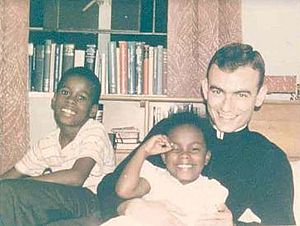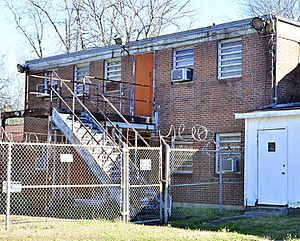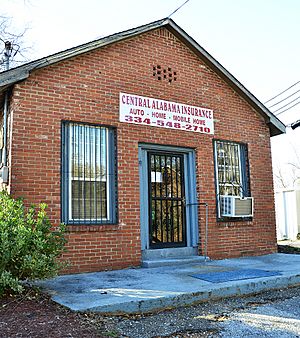Jonathan Daniels facts for kids
Quick facts for kids Jonathan Daniels |
|
|---|---|
 |
|
| Seminarian and civil rights activist | |
| Born | Jonathan Myrick Daniels March 20, 1939 Keene, New Hampshire, U.S. |
| Died | August 20, 1965 (aged 26) Hayneville, Alabama, U.S. |
| Venerated in | Anglican Communion |
| Feast | August 14 |
Jonathan Myrick Daniels (born March 20, 1939 – died August 20, 1965) was a student training to be a minister in the Episcopal Church. He was also a civil rights activist. In 1965, he was killed in Hayneville, Alabama, while protecting a 17-year-old Black activist named Ruby Sales.
Jonathan Daniels saved Ruby Sales' life. They were both working peacefully in Lowndes County. Their goal was to help Black people register to vote and to end segregation in public places. This work happened after the Voting Rights Act was passed that summer. Jonathan Daniels' death helped bring more support to the civil rights movement. In 1991, the Episcopal Church honored him as a martyr. He is remembered every year in their calendar.
Contents
Early Life and Education
Jonathan Myrick Daniels was born in Keene, New Hampshire. His father was a doctor. Jonathan thought about becoming a minister even when he was in high school. He joined the Episcopal Church as a young man.
He went to the Virginia Military Institute and graduated at the top of his class. In 1961, he started studying English literature at Harvard University. During an Easter service in 1962, Jonathan felt a strong call to serve God. He then decided to train to become a minister. In 1963, he began his studies at the Episcopal Divinity School in Cambridge, Massachusetts.
Joining the Civil Rights Movement
In March 1965, Jonathan Daniels heard Martin Luther King Jr.'s call for help. Dr. King asked students and religious leaders to join the movement in Selma, Alabama. They were marching for voting rights from Selma to the state capital of Montgomery.
Jonathan and other students went to Alabama. They planned to stay for a weekend. But Jonathan decided to stay longer to help. He got permission from his seminary to work in Selma for the rest of the semester. He would study on his own and return for exams later.
Work in Selma
In Selma, Jonathan lived with a local African-American family. For several months, he worked to help integrate the local Episcopal church. He brought groups of young African Americans to the church. However, the church members were not very welcoming to them.
In May, Jonathan went back to his seminary to take his exams, and he passed them. He returned to Alabama in July to keep working. He helped people find government agencies that could offer help. He also tutored children and helped poor local people apply for aid. Most importantly, he worked to register voters.
On August 2, 1965, the Voting Rights Act was passed. This law helped protect the right to vote for all citizens. Before this, many Black people in the South were not allowed to vote.
Jonathan Daniels' Legacy
Jonathan Daniels' death was a shock to many people. He was an educated white student who died protecting a Black teenager. His death made many people, including those in the Episcopal Church, understand the serious problem of racial inequality in the South. It also encouraged others to continue fighting for civil rights and social justice.
Ruby Sales, the young woman Jonathan saved, later attended the Episcopal Theological School. She became a human rights advocate in Washington, DC. She even started a mission in the city dedicated to Jonathan Daniels.
Honoring Jonathan Daniels
- In 1991, the Episcopal Church officially recognized Jonathan Myrick Daniels as a martyr. August 14 is now a special day to remember him and all others who died for the civil rights movement.
- The Episcopal Diocese of Alabama and the Episcopal Diocese of the Central Gulf Coast hold a yearly trip to Hayneville on August 14. This trip remembers Daniels and other civil rights martyrs.
- The Virginia Military Institute created the Jonathan Daniels Humanitarian Award in 1998. Former President Jimmy Carter is one of the people who has received this award.
- One of the elementary schools in Jonathan's hometown of Keene, New Hampshire, is named after him.
- Jonathan Daniels is one of 40 martyrs honored at the Southern Poverty Law Center's Civil Rights Memorial in Montgomery, Alabama.
- In 2015, the Washington National Cathedral unveiled a sculpture of Daniels. Ruby Sales was there for the dedication.
Jonathan Daniels in Media
- A play by Lowell Williams, Six Nights in the Black Belt, tells the story of the arrests and Daniels' murder.
- The TV movie Selma, Lord, Selma (1999) mentions Daniels and his death.
- The film Here Am I, Send Me: The Story of Jonathan Daniels (2000) shares his life story and how he died.
 | May Edward Chinn |
 | Rebecca Cole |
 | Alexa Canady |
 | Dorothy Lavinia Brown |



